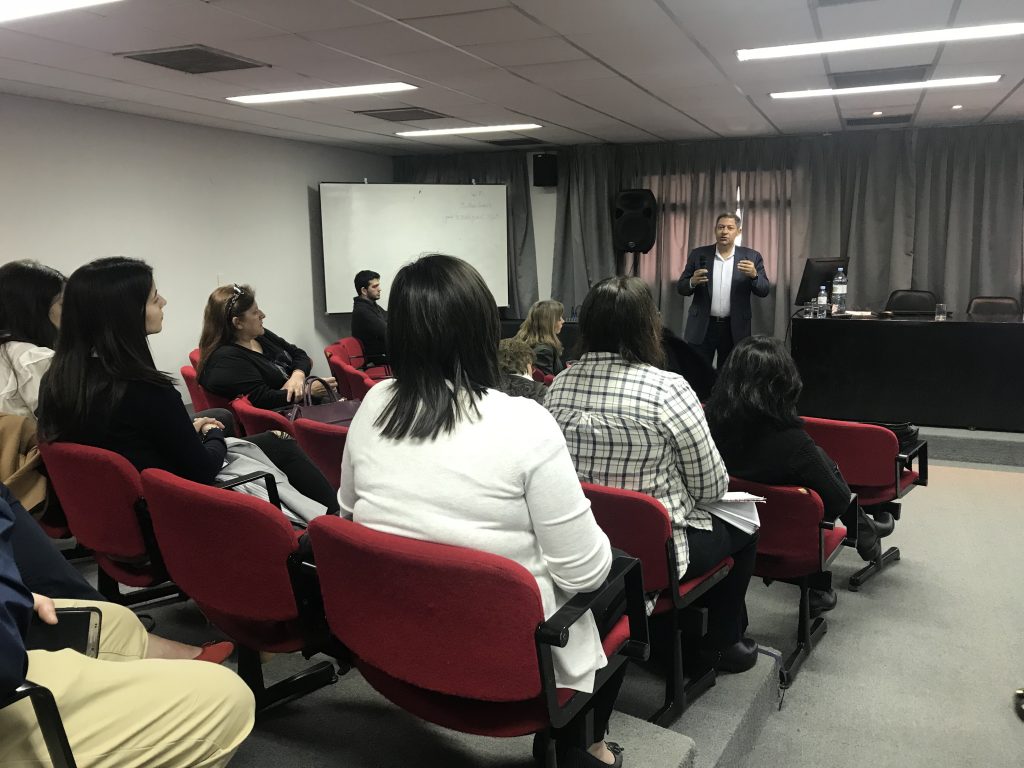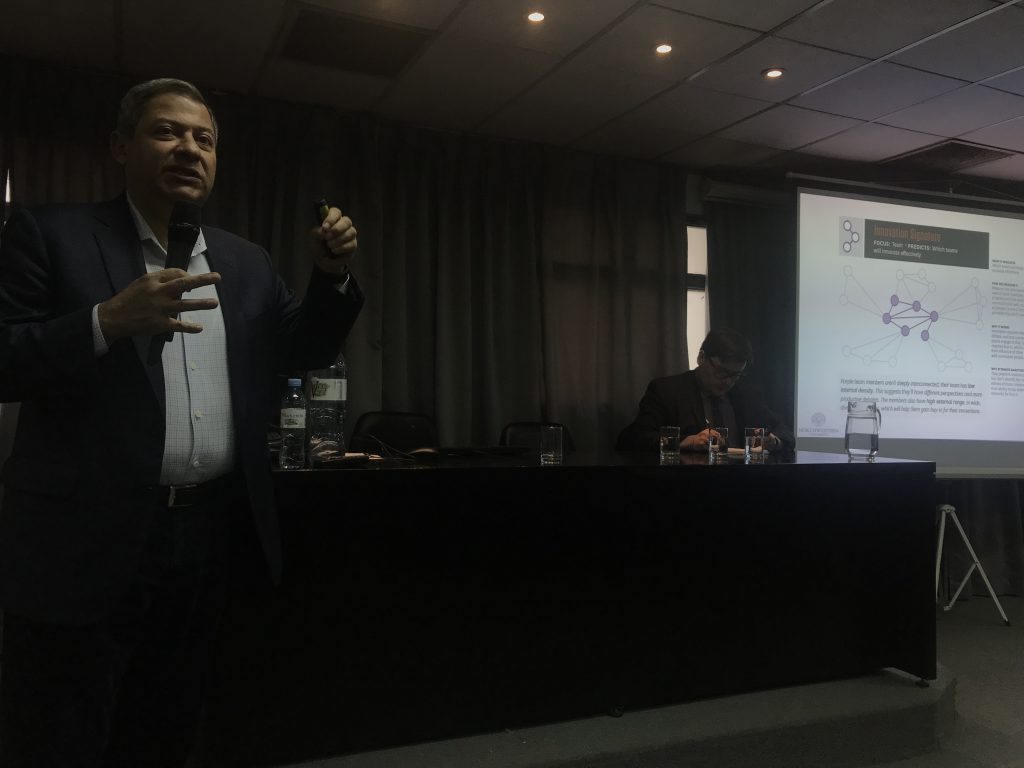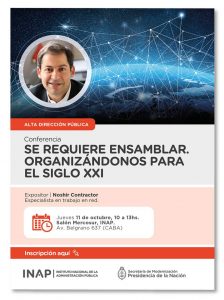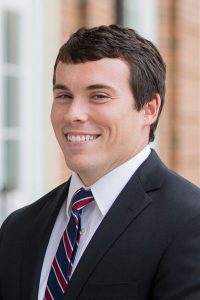Noshir Contractor and Diego Gómez-Zará, Ph.D. student in Technology and Social Behavior, head to Buenos Aires to present, “Some Assembly Required: Organizing in the 21st Century” at the Argentinian Ministry of Modernization of the Nation.



Noshir Contractor and Diego Gómez-Zará, Ph.D. student in Technology and Social Behavior, head to Buenos Aires to present, “Some Assembly Required: Organizing in the 21st Century” at the Argentinian Ministry of Modernization of the Nation.



Abstract:
Abduction is an inference approach that uses data and observations to identify plausible (and preferably, best) explanations for phenomena. Applications of abduction (e.g., robotics, genetics, image understanding) have largely been devoid of human behavior. Here, we devise and execute an iterative abductive analysis process that is driven by the social sciences: behaviors and interactions among groups of human subjects. One goal is to understand intra-group cooperation and its effect on fostering collective identity. We build an online game platform; perform and analyze controlled laboratory experiments; form hypotheses; build, exercise, and evaluate network-based agent-based models; and evaluate the hypotheses in multiple abductive iterations, improving our understanding as the process unfolds. While the experimental results are of interest, the paper’s thrust is methodological, and indeed establishes the potential of iterative abductive looping for the (computational) social sciences.
Ren, Y., Cedeno-Mieles, V., Hu, Z., Deng, X., Adiga, A., Barrett, C. L., et al. (2018). Generative Modeling of Human Behavior and Social Interactions Using Abductive Analysis (pp. 1–8). Presented at the International Conference on Advances in Social Network Analysis and Mining, 2009. ASONAM ’09.
Kim, M. J., Lee, C., & Contractor, N. S. (2019). Seniors’ usage of mobile social network sites: Applying theories of innovation diffusion and uses and gratifications. Computers in Human Behavior (90), 60-73. https://doi.org/10.1016/j.chb.2018.08.046.
On August 11-14, Professor Noshir Contractor and SONIC Alumna Jacqueline Ng presented at the 2018 Academy of Management Conference held in Chicago, Illinois.
Contractor, N. S.
Some Assembly Required: Teaming in the 21st Century.
Paper presented at the Innovations in Teaching Teamwork PDW Workshop
Contractor, N. S.
Multi-theoretical multilevel models of networks.
Paper presented at the Introduction to Social Network Analysis PDW Workshop.
Mukherjee, A., Xiao, P. & Wang, L., & Contractor, N. S.
Does the opinion of the crowd predict success?
Paper presented at the Crowd and Cloud Session.
Ng, J., & Contractor, N.S.
Social Media & Team Collaboration: How the @mention Feature Facilitates and Constrains Teamwork
Paper presented at AOM.
From the Economic Times:
IIT Madras has tied up with Northwestern University, US, for carrying out broad-based research collaboration in data science, web science, network science and computational social science.
The institutes signed an MoU recently to launch a joint project on the development of features for three web-based software platforms that focus on network-based approaches to facilitate team assembly and processes. Professor Ravindra Gettu, dean (Industrial Consultancy and Sponsored Research), IIT Madras, and Dr. Jonathan Holloway, Provost, Northwestern University, U.S., signed the MoU on behalf of their respective Institutions.
Speaking about the importance of this collaboration, Prof. B. Ravindran, Department of Computer Science and Engineering, IIT Madras, and one of the principal collaborators in this project, said, “The SONIC research group at Northwestern University is a world leader in the field of network science. This MoU will allow us to collaborate closely and work on problems that will have a global impact”
Further, Prof Ravindran added, “The Robert Bosch Centre for Data Science and AI at IIT Madras has a significant expertise in the area of network science and this collaboration is the first of our initiatives to reach out to international partners with similar interests”.
The first project under this collaboration is a web-based platform called “My Dream Team” that focuses on assembling people with harmonising skillsets together. Concretely, these platforms take advantage of the survey and the digital trace data generated through sources like enterprise social media platforms to help recommend potential teammates to an individual or make managerial decisions using features rooted in the theories of network science and machine learning.
The principal collaborators on this project are: Prof. B. Ravindran, Department of Computer Science and Engineering, IIT Madras, and Head, Robert Bosch Center for Data Science and Artificial Intelligence, IIT Madras; and IIT Madras Distinguished Alumnus Prof. Noshir Contractor, Jane S. and William J. White Professor of Behavioural Sciences and Director of the Science of Networks in Communities (SONIC) Research Group at Northwestern University.

Aaron M. Schecter, SONIC alumnus and Ph.D. in Industrial Engineering and Management Science, received the 2018 J. Richard Hackman Award for his Ph.D. dissertation at INGroup 2018. The conference recognizes recent graduate students whose dissertation shows the greatest potential to advance the study of groups.
The SONIC research group and ATLAS laboratory at Northwestern University invite applications for a research lab manager to support lab directors Noshir Contractor (SONIC) and Leslie DeChurch (ATLAS) on administrative and operational aspects of their research portfolios.
The lab manager will be responsible for supporting a variety of lab operations, including reporting and compliance requirements, communication of findings through digital displays and online materials, and organization and updating of research materials and files. In addition, the lab manager will assist in training new lab members and other research related activities.
Applicants should send a cover letter, resume, and references to Michael Schultz (michael.schultz@northwestern.edu).
On July 19-21, Professor Noshir Contractor, the SONIC doctoral students Diego Gómez-Zará and Brennan Antone, and the SONIC Research Assistant Professor Alina Lungeanu presented at the 13th Annual INGRoup Conference held in Bethesda, Maryland.
Koustav Rudra presented his work on “Identifying Sub-events and Summarizing Disaster-Related Information from Microblogs” in The 41st International ACM SIGIR Conference on Research and Development in Information Retrieval. The conference was held at Ann Arbor, Michigan from 8th to 12th July, 2018.